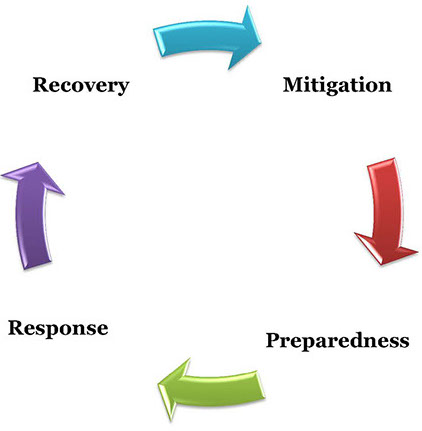The emergency management concept evolved from the post World War II "Civil Defense" program but the "Civil Defense" program dealt principally with disaster preparedness. Emergency Management goes further to include mitigation, response and recovery as part of an integrated program.
Mitigation refers to activities that eliminate or reduce the negative effects of a disaster. Preparedness is planning how you will respond to various emergencies and the resources you will need to get the job done. Response is the actual reaction to an emergency and recovery is the act of returning to a normal or near normal status.
Responsibility for effective Emergency Management starts with the family, therefore every family should have adequate insurance to protect their assets. They should also have a written plan identifying potential emergencies, protective actions, meeting places, evacuation & relocation sites, emergency supplies and important telephone numbers. Unfortunately, some apathetic families do not take any steps to protect themselves or their property from the adverse affects of emergencies and disasters. They feel that the government is there to pick up the tab for their losses. These people usually end up very disappointed.
The following is an example of how your local government participates in the four phases of emergency management:
Mitigation:
- land use management
- zoning ordinances
- building codes
- safety codes
- insuring public assets
Preparedness:
- appoint a local EMA coordinator
- assist in building a local EMA program
- provide support for a local EMA program
- provide support for Public Safety Departments
- identify potential vulnerabilities
- prepare and adopt an Emergency Operations Plan
- have Mutual Aid Agreements in place
Response:
- activate their Emergency Operations Plan
- mobilize EMA and their Public Safety Departments
- mobilize municipal and volunteer resources
Recovery:
- participate in damage assessment
- provide County EMA the information they need to secure Disaster Declarations and debris clearance to reopen roads
- return government to normal operation ASAP
- coordinate the assistance for displaced residents

Making EMA Work In Your Community
Appointment of an EMA coordinator and the development of a local EMA program is the responsibility of your elected officials, but for a program to really work the local residents must participate.
Residents must be willing to donate either their time, talents or the use of some of their possessions for the common good or be prepared to pay more in taxes if they expect government to provide all Emergency Services.
Ways in which residents could participate during an emergency:
- answer phones and relay messages during a disaster emergency
- trained volunteers are needed for local damage assessment teams
- monitor a local rain or stream gauge when flooding is possible
- if you own a van or bus you could provide transportation during an evacuation
- four wheelers and snowmobilers are a valuable resource during severe snow storms
- front end loaders or bull dozers could be used to move earth in order to protect waterways from pollution during fuel spills
Call your local municipal building and let your EMA Coordinator know what service or resource you could provide to your community.
Municipal Emergency Management Coordinators
Beaver Township
Benton Borough
Benton Township
Berwick Borough
Town of Bloomsburg
Briar Creek Borough
Briar Creek Township
Catawissa Borough
Catawissa Township
Centralia Borough
Cleveland Township
Conyngham Township
Fishing Creek Township
Franklin Township
Greenwood Township
Hemlock Township
Jackson Township
Locust Township
Madison Township
Main Township
Mifflin Township
Millville Borough
Montour Township
Mt. Pleasant Township
North Centre Township
Orange Township
Orangeville Borough
Pine Township
Roaring Creek Township
Scott Township
South Centre Township
Stillwater Borough
Sugarloaf Township
Greer Frey
Melissa Doucette
VACANT
Greg Harkins
Michael Reffeor
Greg Harkins
Harold Kern
Robert Jones
VACANT
Tom Hynoski
VACANT
Greg Yeager
Curt Saxton
VACANT
Frederick Scharf
Scott Traugh
Carl Spiece
VACANT
Rob Bower
Ralph DeFrain
Rick Brown
Rob Bower
Paul Kreisher
David Mosteller
Steve Hess
Gene Fetterman
Neil Shultz
Jim Brown
VACANT
Earl (Skip) Mordan
Bill Richendrfer
Timothy Strong
Beverly Lutcavage
Township Phone # 570-784-4852
Borough Phone # 570-925-6101
Township Phone # 570-925-6166
Borough Phone # 570-752-2723
Town Phone # 570-784-7123
Borough Phone # 570-752-2723
Township Phone # 570-752-5390
Borough Phone # 570-356-2561
Township Phone # 570-356-2686
Borough Phone # 570-274-0365
Township Phone # 570-799-5806
Township Phone # 570-875-0777
Township Phone # 570-683-6033
Township Phone # 570-799-5806
Township Phone # 570-458-0212
Township Phone # 570-784-6178
Township Phone # 570-925-2401
Township Phone # 570-799-5710
Township Phone # 570-458-0224
Township Phone # 570-784-0951
Township Phone # 570-752-4651
Borough Phone # 570-458-5709
Township Phone # 570-784-4222
Township Phone # 570-784-3515
Township Phone # 570-759-2733
Township Phone # 570-683-5836
Borough Phone # 570-683-5948
Township Phone # 570-458-5709
Township Phone # 570-799-5806
Township Phone # 570-784-1357
Township Phone # 570-784-7718
Borough Phone # 570-925-2381
Township Phone # 570-925-6031